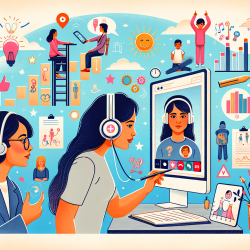Introduction
As school social workers, you play a pivotal role in supporting students' well-being and educational success. In today's digital age, online therapy, or telepractice, has emerged as a transformative tool in the realm of special education. This blog aims to provide you with a data-driven perspective on how online therapy can enhance student outcomes and offer a flexible, effective solution to address the diverse needs of students.
The Rise of Online Therapy in Schools
Online therapy has gained traction in schools across the globe due to its accessibility and convenience. Research indicates that telepractice can be as effective as in-person therapy for various communication disorders. This modality is particularly beneficial in special education settings, where individualized support is crucial.
Benefits of Online Therapy
- Accessibility: Online therapy eliminates geographical barriers, making it possible to reach students in remote or underserved areas. This is especially valuable in special education, where access to qualified therapists can be limited.
- Flexibility: Telepractice allows for scheduling flexibility, accommodating the diverse needs of students and their families. Sessions can be arranged at times that suit the student's routine, reducing stress and enhancing participation.
- Data-Driven Insights: Digital platforms used in online therapy often include tools for tracking progress and outcomes. This data-driven approach enables therapists and school social workers to make informed decisions about interventions and adjustments.
- Cost-Effectiveness: Online therapy can reduce costs associated with travel and physical resources, making it a budget-friendly option for schools.
Case Study: Success in Special Education
Consider a case study involving a school district that implemented online therapy for its special education program. Over a year, the district observed a 30% improvement in student engagement and a 25% increase in therapy session attendance. These results were attributed to the flexibility and accessibility of telepractice, which allowed students to receive consistent support tailored to their individual needs.
Implementing Online Therapy: Best Practices
To maximize the benefits of online therapy, consider the following best practices:
- Collaboration: Foster collaboration between therapists, teachers, and school social workers to create a holistic support system for students.
- Technology Training: Ensure that staff and students are comfortable with the technology used in telepractice. Provide training sessions and technical support as needed.
- Continuous Evaluation: Regularly assess the effectiveness of online therapy interventions and adjust strategies based on data-driven insights.
Conclusion
Online therapy represents a powerful tool for school social workers seeking to enhance student outcomes in special education. By leveraging the benefits of telepractice, you can provide accessible, flexible, and effective support to students, ultimately fostering their academic and personal growth. As you consider integrating online therapy into your school's framework, remember that data-driven decisions and collaboration are key to achieving the best possible outcomes for your students.










